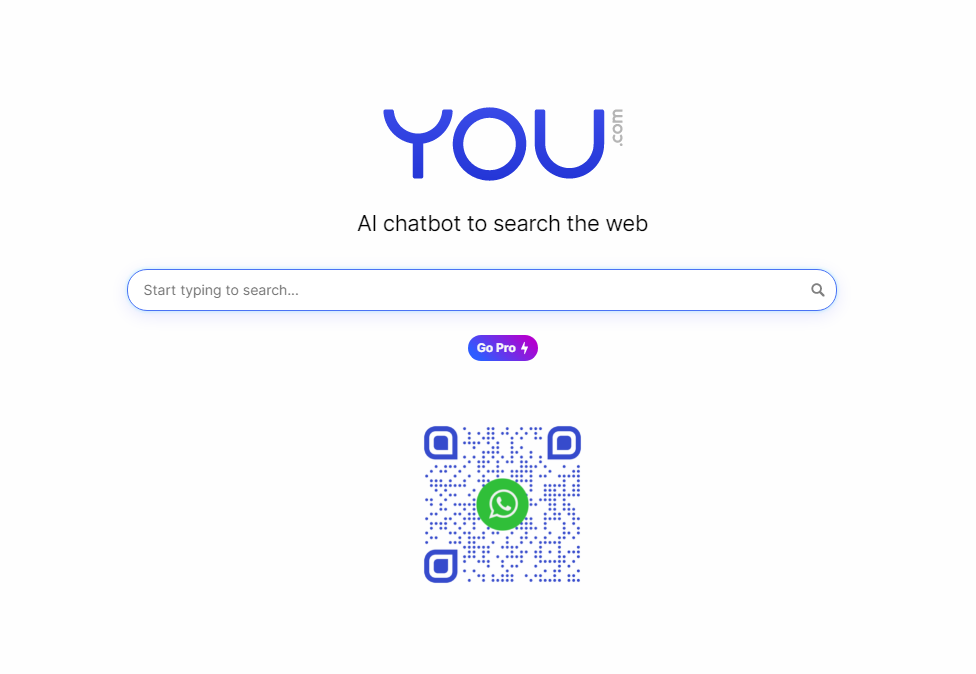Computer scientist Richard Socher conceived the idea when he was a doctoral student at Stanford University. You.com, but between 2009 and 2014, Socher chose to put the concept on hold due to Google’s dominance.

With the development of prompt engineering — the method of creating inputs for generative AI tools to produce desired outputs — and advances in natural language processing, Socher and co-founder Bryan McCann realized that search could evolve to provide summary answers, a direction that Google didn’t seem to be moving in.
“We weren’t seeing any change, so we decided someone had to do this,” Socher said when he launched You.com in 2020.
The startup hopes to differentiate itself from companies such as Google, OpenAI and Perplexity that already offer or are developing search and AI services by targeting complex queries for corporate users. Socher was also recognized by Time magazine last year as one of the 100 most influential people in the field of AI, and was praised for "his research in natural language processing has played a key role in the development of the field."
You.com is named after Salesforce CEO Marc Benioff, who gifted the domain to Socher. The two met in 2016 when Salesforce acquired Socher’s deep learning platform MetaMind. Socher served as Salesforce’s chief scientist and executive vice president until 2020. (Benioff, it should be noted, owns Time magazine.)
You.com is a domain that Benioff has owned for many years. Socher thinks it is "a great consumer domain name" that can be combined with many words that begin with "u" (such as user, university) to form interesting puns.
As CEO of You.com, Socher is now focusing on the increasingly popular field of AI search, where platforms perform research and analysis for users and provide summaries of answers with citations. He is competing with the giants in the search and AI fields for a market share that is expected to reach $430 billion by 2032.
Beyond Google Search
The Palo Alto, California-based startup started out as a search engine, but Socher acknowledged that Google has taken over the market for short information queries like “Who was the first president of the United States?” or “What is the capital of Maryland?” (Google controls about 901% of the global search engine market.)
“You can’t answer these questions better than Google,” he said.
As a result, You.com began focusing on knowledge workers, or employees whose “careers depend on getting accurate answers and coming up with fairly complex answers.” Now the company is more inclined to position itself as an AI assistant or “productivity engine,” he added.
Unlike simple searches, You.com strives to generate accurate responses to complex queries and provide relevant citation sources. This includes queries that require researching and summarizing information from multiple websites, as well as multi-step complex problem solving.
“The ultimate goal is to make you more efficient and give you the answers you need so you can accomplish what you want to accomplish,” Socher said.
If this sounds similar to Google’s AI Overview, OpenAI’s SearchGPT, or the AI search engine Perplexity, that’s because it is. But You.com noted last November that it launched the first consumer-facing, internet-accessible large-scale language model (LLM) capable of providing answers and citations in December 2022. Socher said he has patents that prove the company’s technology is ahead of the curve. (Perplexity’s answer engine also launched in December 2022, AI Overview in May, and SearchGPT in July.)
You.com in action
You.com has some notable differences. It allows users to choose from 21 AI models, including GPT-4o (which powers ChatGPT and SearchGPT), Anthropic’s Claude 3.5 Sonnet, Meta’s Llama 3.1 405B, and Google’s Gemini 1.5 Flash, or let You.com choose for you. (It’s not clear what the selection criteria are.)
You can also instruct You.com to focus on specific sources, such as scientific journals.
The simple test asks a long-standing mystery: Why is it so difficult to prove the existence of "wild men"?
You.com's 353-word answer cited the children's question-and-answer site Wonderopolis.org, the science and travel publication NationalGeographic.com, the online encyclopedia Wikipedia, and the science and nature magazine SmithsonianMag.com. It cited a lack of evidence, hoaxes and misidentifications, unreliable eyewitness reports, cultural factors, and scientific skepticism.
Perplexity generated a 313-word response that also cited SmithsonianMag.com and Live Science. The response also mentioned lack of evidence, unreliable eyewitness reports, cultural factors, and ecological irrationality.
Apart from the wide range of sources, there is not much difference between the two that one would notice.
Then he asked: "Which is the best AI search engine?"
You.com generated a 268-word answer that listed You.com, Perplexity, Neeva, Brave Search, Komo, and Arc Search. Its sources included SEO agency Boostability, CNET sister publication ZDNet, and AI website builder Dorik.com.
But there was a mistake: Neeva was acquired by data platform Snowflake in 2023, and its search technology was integrated into Snowflake's platform.
Perplexity generated a 222-word response that listed some familiar names like Bing AI and Andi. It also cited ZDNet and Dorik, as well as blog site KDNuggets and AI resource site AI-Pro.
People aren't sure how much to trust KDNuggets or AI-Pro, but considering You.com's mistake, users aren't sure which one is really superior.
To be fair, this is just scratching the surface, and You.com is focusing on enterprise use cases right now, so it’s not directly competing with these consumer-facing AI search engines.
In November, You.com released an API that allows developers to bring real-time web search to their own LLMs and AI chatbots.
You can also use You.com to build an interactive work assistant to generate blog headlines, optimize SEO content, or identify all possible sourcing sources for a product.
You.com does not disclose user data.
Individual and business users can use limited models and upload permissions for free, or pay an annual fee of $15 or monthly fee of $20. Team plans also have custom pricing.
The startup completed a $25 million Series A funding round in 2022. Salesforce’s Benioff is one of the startup’s investors.